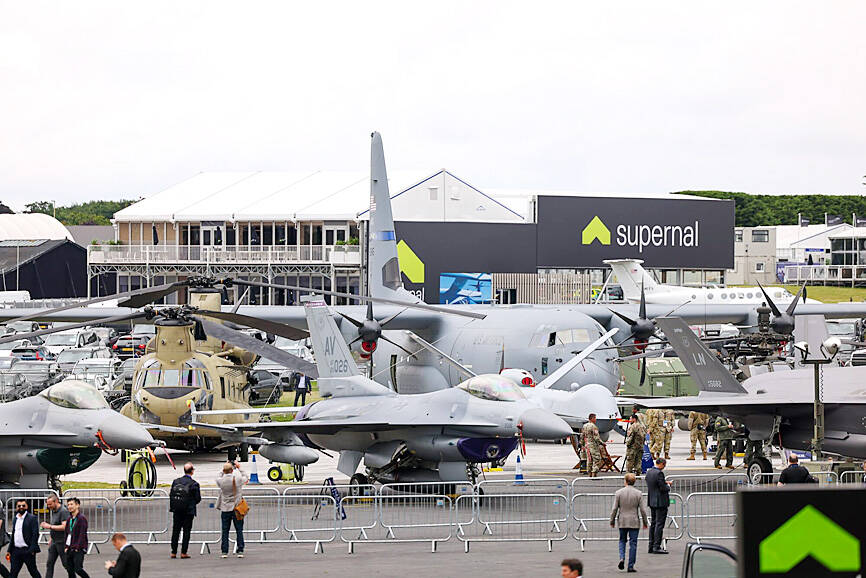Aerospace Industrial Development Corp (AIDC, 漢翔航空工業) has signed memorandums of understanding (MOU) with foreign companies to collaborate on technologies related to tanks, warplanes and drones, the company said in a statement yesterday.
Last week, AIDC chairman Hu Kai-hung (胡開宏) and AIDC personnel visited the UK and signed the MOUs while attending the biannual Farnborough International Airshow.
The MOUs include an agreement to collaborate on military technologies for reconnaissance, defense and attack, are expected to enhance AIDC’s technology and provide complete support for the armed forces, he said.

Photo: Bloomberg
The nation’s ability to defend itself independently stems from its local military capability, Hu said, adding that AIDC would spare no effort boosting Taiwan’s independent defense capabilities.
AIDC took the first step by allying with a European aviation giant to jointly innovate drone countermeasures, as drone technology is developing rapidly worldwide.
Combining its high-quality techniques in avionics and system integration with the European company’s counter-uncrewed aircraft systems, AIDC could quickly tap into the drone market at home and abroad, while incorporating the domestic aerospace supply chain in Taiwan to develop defense devices for detection and interference that would meet different client needs.
Next, AIDC collaborated with a major US defense contractor on the upgrade of the M60 Main Battle Tank, and maintenance of 600-gallon fuel tanks, in line with the armed force’s project to upgrade 460 M60A3 Tanks.
The US defense contractor, having assisted many countries in upgrading more than 1,000 M60A3 Tanks, would transfer technology to AIDC and help develop its maintenance abilities, AIDC said, adding that it would draw on its successful experiences from its F-16 Maintenance Center, AIDC said.
The US company also licensed AIDC to maintain and repair the 600-gallon wing fuel tanks for F-16 fighter jets, helping to expand the servicing scope of the F-16 Maintenance Center, AIDC said.
As AIDC improved the performance of 140 serving F-16A/B fighters last year in line with the government’s Project Soaring Phoenix (鳳翔專案), and having purchased more than 60 F-16V Block 70 fighters from the US Air Force, Taiwan would soon have a fleet of more than 200 F-16V fighter jets — the largest air fleet in Asia.
Having been the primary contractor of the F-16 Maintenance Center and accumulating considerable logistics and maintenance experience locally in Taiwan, AIDC would develop maintenance abilities in collaboration with the US company to provide immediate services for the air force, AICD said.
Meanwhile, AIDC has also signed a deal with the US aviation system manufacturer that produces the Joint Helmet Mounted Cueing System (JHMCS), which is an advanced aviation device that helps pilots track and target enemy fighters.
The US company could offer fast delivery and competitive prices via commercial sales to promote the JHMCS business jointly with AIDC, while also providing technical support for AIDC to help maintain and repair the JHMCS.
By equipping F-16V fighter jets with the JHMCS, AIDC aims to directly boost the air force’s military strength, the statement said.

An essay competition jointly organized by a local writing society and a publisher affiliated with the Chinese Communist Party (CCP) might have contravened the Act Governing Relations Between the People of the Taiwan Area and the Mainland Area (臺灣地區與大陸地區人民關係條例), the Mainland Affairs Council (MAC) said on Thursday. “In this case, the partner organization is clearly an agency under the CCP’s Fujian Provincial Committee,” MAC Deputy Minister and spokesperson Liang Wen-chieh (梁文傑) said at a news briefing in Taipei. “It also involves bringing Taiwanese students to China with all-expenses-paid arrangements to attend award ceremonies and camps,” Liang said. Those two “characteristics” are typically sufficient

A magnitude 5.9 earthquake that struck about 33km off the coast of Hualien City was the "main shock" in a series of quakes in the area, with aftershocks expected over the next three days, the Central Weather Administration (CWA) said yesterday. Prior to the magnitude 5.9 quake shaking most of Taiwan at 6:53pm yesterday, six other earthquakes stronger than a magnitude of 4, starting with a magnitude 5.5 quake at 6:09pm, occurred in the area. CWA Seismological Center Director Wu Chien-fu (吳健富) confirmed that the quakes were all part of the same series and that the magnitude 5.5 temblor was

The brilliant blue waters, thick foliage and bucolic atmosphere on this seemingly idyllic archipelago deep in the Pacific Ocean belie the key role it now plays in a titanic geopolitical struggle. Palau is again on the front line as China, and the US and its allies prepare their forces in an intensifying contest for control over the Asia-Pacific region. The democratic nation of just 17,000 people hosts US-controlled airstrips and soon-to-be-completed radar installations that the US military describes as “critical” to monitoring vast swathes of water and airspace. It is also a key piece of the second island chain, a string of

The Central Weather Administration has issued a heat alert for southeastern Taiwan, warning of temperatures as high as 36°C today, while alerting some coastal areas of strong winds later in the day. Kaohsiung’s Neimen District (內門) and Pingtung County’s Neipu Township (內埔) are under an orange heat alert, which warns of temperatures as high as 36°C for three consecutive days, the CWA said, citing southwest winds. The heat would also extend to Tainan’s Nansi (楠西) and Yujing (玉井) districts, as well as Pingtung’s Gaoshu (高樹), Yanpu (鹽埔) and Majia (瑪家) townships, it said, forecasting highs of up to 36°C in those areas